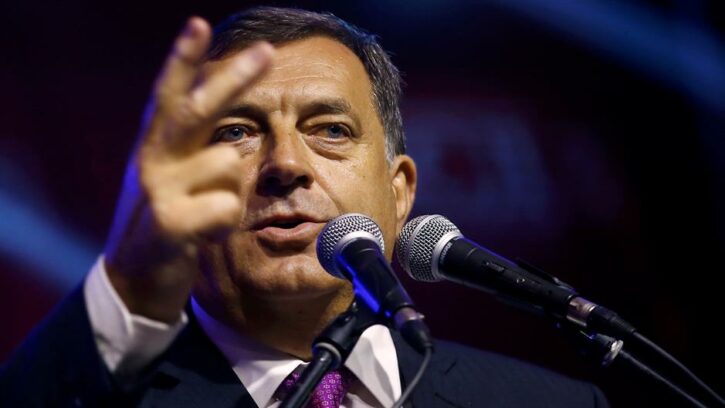
The newly elected Serb member of Bosnia’s tripartite Presidency, Milorad Dodik, said he will oppose a lawsuit the newly elected Croat Presidency member announced against neighbouring Croatia regarding a bridge the country is building across Bosnia’s waters, Vecernji List reported on Saturday.
The Peljesac Bridge is intended to link the Croatian mainland and the Peljesac Peninsula, bypassing a 15 kilometre-long strip around the city of Neum that represents Bosnia and Herzegovina’s only coast on the Adriatic Sea. The bridge would cut travel time between the Dubrovnik area and the rest of the country by circumventing customs and border controls around Neum.
The project formally kicked off in July this year, with Croatia's state-owned road management company Hrvatske Ceste (HC) and the China Road and Bridge Corporation (CRBC) officially signing the handover of project documents for the construction.
Predominantly Bosniak political parties are opposing the construction of the Peljesac Bridge because they believe it might prevent large vessels from entering Bosnia's Bay of Neum, threatening Bosnia's access to open sea.
But Zeljko Komsic, who was on Sunday elected the new Croat member of Bosnia’s Presidency, announced he would back a lawsuit against Croatia regarding the project.
In order for the Presidency to make such a decision, a consensus between all three of its members must be made. Dodik, who had months ago announced a coalition with Komsic’s fierce political opponent Dragan Covic, who backs the construction of the bridge, said that he will oppose the lawsuit because Croatia has a sovereign right to build it.
Bosnian Croats have been protesting the election of Komsic, saying he is not their legitimate representative.
Bosnia is composed of two territorial and political semi-autonomous entities, the Bosnian Serb-majority Republika Srpska (RS) and the Federation (FBiH), shared by Croats and Bosniaks. While the Serb Presidency member is elected from the RS, the Bosniak and Croat members are elected in the Federation.
However, since there are many more Bosniaks than Croats in the Federation, Croat nationalist parties have been complaining that Bosniaks are able to elect the Bosnian Croat Presidency member. They said that this has already happened twice before, and that it happened again in the General Election on Sunday, when Komsic, who is the leader of the left-leaning Democratic Front (DF) and who they say is not a legitimate representative of Bosnian Croats, was elected.
Dodik also criticised the election of Komsic, saying that he will not allow the will of any ethnic group in Bosnia to be undermined, as it goes against the 1995 Dayton Peace Agreement, which ended the war in the country.
“Bosnia will or will not be a country of three constituent peoples. We are committed to peace, but there will surely be no kind of domination,” Dodik said.
He said he thinks the international community has, for the first time, truly become concerned over the ‘Komsic case’ and that it is now asking for Bosnia to change its Constitution and Election Law regarding it.
HDZ leader Covic was outvoted in the election, he said, but added that this does not mean that the Croat position has disappeared from the political scene.
“To the contrary, if it comes to attempt for some things to be imposed, we will have an escalation. In case the international community manages to calm down Croats, it will be much more difficult to tend to the ‘Croat issue’ in a few years,” he said, adding that neighbouring Croatia has made a mistake in not setting clear conditions for the interests of Croat people in Bosnia.
Dodik, who has in the past been advocating the secession of Bosnia’s Serb-dominated part, Republika Srpska (RS), from Bosnia, said that a concept of Bosnia and Herzegovina as a unitary state must be abandoned.
“It is unacceptable for the international community to always watch the back of the Bosniak side and support their demands. That is damaging to the Serbs and Croats. Those times are over but Bosniaks are maintaining the same attitude,” he said.




